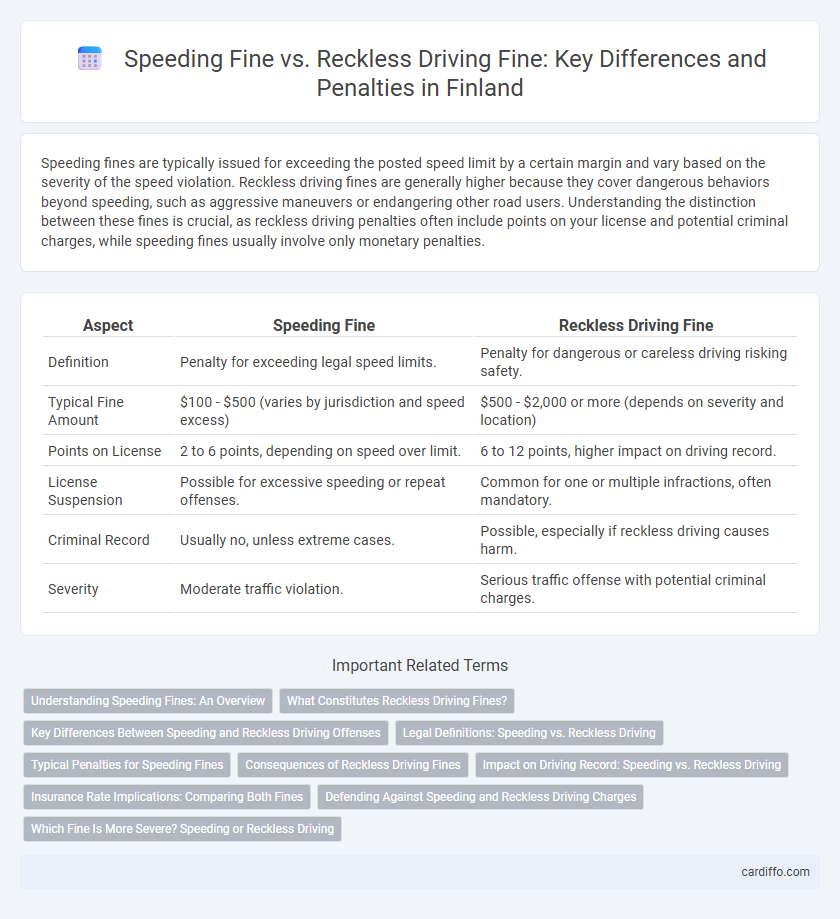Speeding fines are typically issued for exceeding the posted speed limit by a certain margin and vary based on the severity of the speed violation. Reckless driving fines are generally higher because they cover dangerous behaviors beyond speeding, such as aggressive maneuvers or endangering other road users. Understanding the distinction between these fines is crucial, as reckless driving penalties often include points on your license and potential criminal charges, while speeding fines usually involve only monetary penalties.
Table of Comparison
| Aspect | Speeding Fine | Reckless Driving Fine |
|---|---|---|
| Definition | Penalty for exceeding legal speed limits. | Penalty for dangerous or careless driving risking safety. |
| Typical Fine Amount | $100 - $500 (varies by jurisdiction and speed excess) | $500 - $2,000 or more (depends on severity and location) |
| Points on License | 2 to 6 points, depending on speed over limit. | 6 to 12 points, higher impact on driving record. |
| License Suspension | Possible for excessive speeding or repeat offenses. | Common for one or multiple infractions, often mandatory. |
| Criminal Record | Usually no, unless extreme cases. | Possible, especially if reckless driving causes harm. |
| Severity | Moderate traffic violation. | Serious traffic offense with potential criminal charges. |
Understanding Speeding Fines: An Overview
Speeding fines vary based on the severity and location of the violation, with higher penalties imposed for excessive speed in school or construction zones. These fines are calculated considering factors such as the speed over the limit and previous offenses, often resulting in points on the driver's license. Understanding specific speeding fine structures helps drivers anticipate costs and consequences, promoting safer road behavior.
What Constitutes Reckless Driving Fines?
Reckless driving fines are imposed for operating a vehicle with willful or wanton disregard for safety, including excessive speeding, aggressive maneuvers, or street racing. These fines are typically higher than standard speeding fines due to the increased risk of causing accidents or endangering lives. Penalties often include substantial monetary fines, license suspension, and possible criminal charges depending on the severity of the offense.
Key Differences Between Speeding and Reckless Driving Offenses
Speeding fines are typically lower and issued for exceeding posted speed limits, whereas reckless driving fines are substantially higher due to the dangerous nature of the behavior, such as aggressive maneuvers or disregard for traffic laws. Reckless driving offenses often involve more severe legal consequences, including license suspension, higher insurance rates, and potential jail time, reflecting the greater risk posed to public safety. Speeding violations generally lead to points on a driver's license and smaller fines, emphasizing the distinction between minor infractions and hazardous driving conduct.
Legal Definitions: Speeding vs. Reckless Driving
Speeding is legally defined as driving above the posted speed limit, reflecting a violation of traffic regulations focused solely on speed control. Reckless driving entails operating a vehicle with a willful disregard for safety, demonstrating intentional or severe negligence beyond mere speed violations. Courts differentiate these offenses based on evidence of intent and risk, resulting in more severe penalties for reckless driving compared to speeding infractions.
Typical Penalties for Speeding Fines
Typical penalties for speeding fines include monetary fines ranging from $100 to over $1,000 depending on the speed over the limit and jurisdiction. Points are often added to the driver's license, which can lead to increased insurance premiums and potential license suspension. Repeat offenses or excessive speeding may result in higher fines, mandatory driving courses, or even jail time.
Consequences of Reckless Driving Fines
Reckless driving fines carry severe legal consequences including higher monetary penalties, potential license suspension, and even jail time, reflecting the increased danger posed to public safety. These fines can also result in significantly elevated insurance premiums and a permanent criminal record, affecting future employment opportunities. Unlike typical speeding tickets, reckless driving offenses often require mandatory court appearances and participation in driver improvement programs.
Impact on Driving Record: Speeding vs. Reckless Driving
Speeding fines typically result in points added to a driving record, which can lead to increased insurance premiums but usually cause less severe long-term consequences. Reckless driving fines carry heavier penalties, often including more points, license suspension, and a lasting negative impact on the driving record. The greater severity of reckless driving convictions significantly harms insurance rates and driving privileges compared to speeding violations.
Insurance Rate Implications: Comparing Both Fines
Speeding fines typically lead to moderate increases in insurance rates, reflecting the insurer's assessment of elevated risk tied to exceeding speed limits. Reckless driving fines, however, often result in significantly higher insurance premiums due to the behavior's association with severe danger and liability. Insurance companies weigh reckless driving violations more heavily, causing long-term financial impacts beyond the immediate fine.
Defending Against Speeding and Reckless Driving Charges
Defending against speeding fines requires presenting evidence such as calibrated speed detection devices or challenging officer testimony to reduce penalties. Reckless driving fines demand a stronger defense, often involving proving the absence of willful negligence or dangerous intent by examining road conditions and driver behavior. Legal strategies tailored to each charge significantly improve the chances of mitigating fines or dismissing reckless driving allegations.
Which Fine Is More Severe? Speeding or Reckless Driving
Reckless driving fines are generally more severe than speeding fines due to the increased risk and potential harm involved. Speeding fines typically vary based on the speed over the limit and location but usually carry lower penalties compared to reckless driving, which can include harsher fines, license suspension, and even criminal charges. The legal consequences and insurance impact for reckless driving far exceed those for standard speeding violations.
Speeding Fine vs Reckless Driving Fine Infographic

 cardiffo.com
cardiffo.com